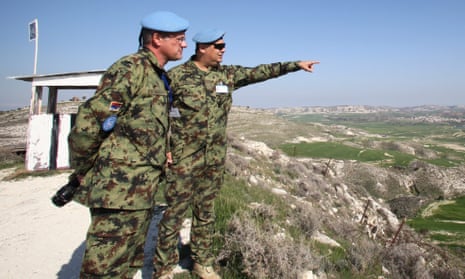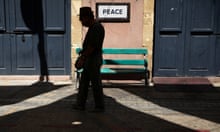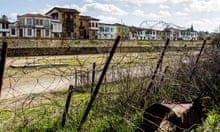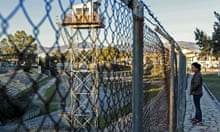A historic effort to end the division of Cyprus has begun in earnest as Greek and Turkish community leaders resumed reunification talks before a high stakes multilateral conference, the first since the island’s partition 43 years ago.
After 18 months of intensive negotiations to settle inter-ethnic divisions, Nicos Anastasiades and Mustafa Akıncı will attempt to finesse the details of a peace deal in Geneva this week by poring over maps and discussing territorial trade-offs before tackling the potentially explosive issue of security.
Asked if he was optimistic as he arrived at the UN’s European headquarters on Monday morning, Anastasiades, the Greek Cypriot leader, said: “Ask me when we are finished.”
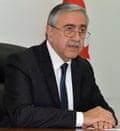
For an island the finer skills of peacemakers has long eluded, the talks are seen as a defining moment in the arduous process of resolving what has long been regarded as the Rubik’s cube of diplomacy.
On Sunday, the new UN secretary general, António Guterres, described the talks as a historic opportunity. In Nicosia officials on both sides of the buffer zone spoke of “the best and last chance” for a settlement. Other experts described the talks as the endgame.

“This is the final phase of the final phase,” said Hubert Faustmann, a professor of history and political science at the University of Nicosia. “It will be the first time since 1974 that Turkey and the Greek Cypriots will hold direct talks at the negotiating table.”
A week of fierce horse-trading lies ahead before Greece, Turkey and former colonial power Britain – the island’s three guarantors under its post-independence constitution – convene on 12 January to address the issues of troop presence and security in an envisioned federation. Both are seen as crucial to ensuring 1974 is never repeated.
“It is a classical final stage of negotiation,” said Faustmann. “Issues that neither side could agree on and have been kept pending will now be interlinked.”
The commitment to a settlement shown by Anastasiades and Akıncı has helped to raise hopes. The two men have shown a rare moderation, with some tracing their desire for a solution to their shared heritage as sons of the southern city of Limassol. Like Akıncı, Anastasiades – who heads Cyprus’s internationally recognised south – has memories of coexistence and believes time will only work against reunification.
At a time of unprecedented uncertainty in Europe and growing global volatility, the need for a good news story has also added impetus. From Washington to Ankara there is recognition that a deal would bring stability to the wider region. The prospect of Greeks and Turks, Christians and Muslims cooperating in the continent’s eastern corner would, say officials, send a powerful message and be a beacon of hope.
Acknowledging a settlement will help set the tone for 2017, Turkey and Britain agreed at the weekend that a solution would be a game-changer. In statements made after the British prime minister, Theresa May, spoke by telephone to her Turkish counterpart, Recep Tayyip Erdoğan, Downing Street said both leaders saw the talks as offering “a real opportunity to secure a better future for Cyprus and to guarantee stability in the wider region”.
The discovery of oil and natural gas deposits in the eastern Mediterranean and the spectre of Cyprus becoming an energy hub through which the reserves could be pumped to Europe has also helped drive the process.
Because peace talks have floundered so many times, however, there is consensus that if they do so again reunification efforts could collapse once and for all. Analysts have expressed fears that in event of failure Turkey could move to annex the north, where it continues to station more than 40,000 troops since invading in response to an Athens-inspired coup aimed at uniting the island with Greece. Guarantor powers have the right of military intervention, a right that Ankara is determined to maintain.
With both sides working on the premise that nothing is agreed until everything is agreed, officials are electing to voice cautious optimism.
“The last mile is always the most difficult,” a senior official in Ankara said.
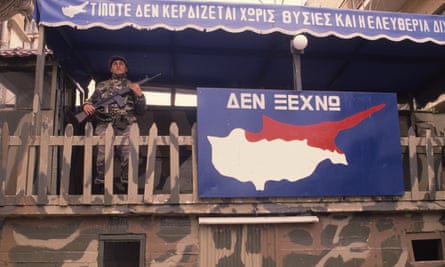
Any agreement will be put to twin referendums, which also raises the stakes. The last time a reunification deal was put to public vote in 2004, the minority Turks supported it but it was rejected by the Greek majority.
Persuading the Turks to surrender enough territory to allow at least 90,000 Greek Cypriots displaced by the invasion to return to their homes is now pivotal to any deal.
Turkish Cypriots, citing the inter-ethnic violence that erupted after independence, in turn insist that mainland troops must remain to protect them in the event of renewed conflict.
The EU, which is likely to be represented by the European commission president, Jean-Claude Juncker, counters that Cyprus’s membership of the bloc is security enough. Greek Cypriots worry that without a withdrawal of troops their own security will never be guaranteed.
In talks so far, progress has been made on issues of governance, political power-sharing, the economy and the EU. Insiders liken the week ahead to a game of poker, in which concession and compromise will ultimately prevail, and there is thriller-like suspense over whether a comprehensive accord can finally be achieved. Heading to Geneva, Akıncı said it would be impossible to cover everything by the end of the week. The Greek foreign minister, Nikos Kotzias, echoed that sentiment, saying the talks were part of an open-ended process that should not be considered abortive if they were not conclusive.
Much will depend on Erdoğan, who has shown more flexibility on Cyprus than other Turkish leaders but is famously unpredictable.
The president, who has not clarified whether he will attend the talks, could exploit a Cyprus solution to improve ties with Europe that have become increasingly strained over migration. “It is he, and he alone, who will decide whether Turkey makes the concessions to solve the Cyprus problem,” Faustmann said. “But which way he will go, nobody knows.”
